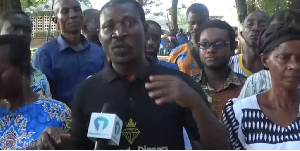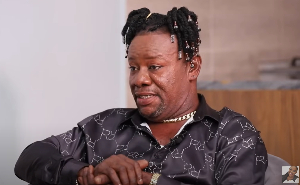A-ten-member referendum campaign committee has been inaugurated at Daboase in the Wassa-East District to sensitize the voter population for a massive turn-out in the upcoming December 17 referendum exercise.
The committee is being chaired by the District Chief Executive (DCE) for the area, Mr. Wilson Arthur.
Other members are the District Co-ordinating Director, Mr.Frank Ernest Oduro, a representative from the NCCE, Mr.Simon Awortwe, Mr.Anthony Quaicoe from the Planning Department, a representative from the Information Services Department, Mr. Kwabena Danso.
The rest are Mr.Amos Adjei, youth representative, Madam Grace Commey, Women Representative, an Opinion Leader, Mr.J.B.Tawiah, a representative from Civil Society Organization, Mr.Kwabena Boachie and Mr.Kwabena Ennin Boahen as Public Relations Officer (PRO).
The committee has drawn up a five-week intensive campaign strategy with effect from Monday, November 4, 2019, to drum home the message to achieve its target.
In his inaugural address, Mr Arthur said the District has an estimated voter population of 51,000 in 117 scattered polling stations which are served by commercial, community radio stations and information centres.
He said the Assembly has created strategic sub-committee dubbed, media sub-committee with Mr.Kwabena Ennin Boahene and Mr. Kwamena Boachie leading the campaign and a community campaign team powered by the NCCE, and ISD/CSOs and the planning officer who would visit communities and encourage voters directly to execute its plan of achieving the 40% plus voter turn-out with 75½ % plus YES voter target for the Wassa-East constituency.
Mr.Arthur who is the Dean of MMDCEs in the Western Region said 250 volunteers in communities would be recruited and trained to champion intensive campaign to achieve polling station targets.
The DCE noted that this action plan has catered for monitoring and evaluation to facilitate necessary training and intervention invested in communities that have it tough to achieve set out target.
Mr Arthur outlined the importance of voting YES in the referendum exercise as it would facilitate enhanced voter participation through investment in competition in local elections as well as support funding of local level election candidates.
He said voting YES meant accountability and a mutual interest in developmental initiatives.
Revenue accruing to the District Assembly (Common Fund) would now increase and the private sector would collaborate with Assemblies for more developmental efforts.
The referendum would also promote power-sharing to reduce tension and agitations in the country, facilitate appointments for political parties to address local development issues.
It would also legalize political involvement in local government and open up opportunities for aspiring political leaders to start their career.
Mr. Arthur used the occasion to commend the Institute of Democratic Governance (IDEG) for a healthy partnership in the Wassa-East District for the specialist training to ensure the success of the referendum.
Regional News of Monday, 4 November 2019
Source: ghananewsagency.org

















